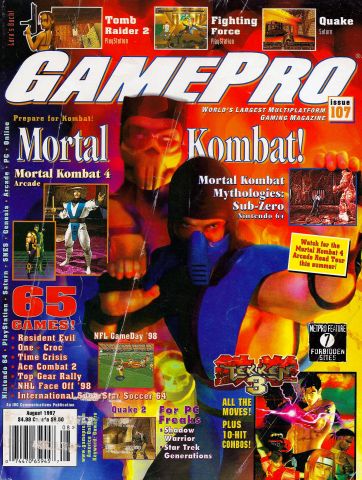Leaderboard
Popular Content
Showing content with the highest reputation on 12/09/2019 in all areas
-
1 point
-
1 point
-
LOL. Fair enough. I suppose if you can wrap your brain around the idea that there is or ever will be a need to examine ad copy for a better historical context of gaming culture as part of a legitimate scholarly venture of some sort, you may be right. I don't think it will surprise you to learn that I don't personally feel that any scholastic dissertations citing video game magazines as their primary source can be taken very seriously, but who knows? I took a couple of crazy courses when I was in Uni, and it's shocking sometimes what sort of stuff people will try to make a thesis paper about, so...hmmm...actually, now that I think about it, I'm sure someone has already written just such a dissertation at some point. You're right, of course, though. No information is useless, but there is definitely information of far less usefulness than other information, and I'd have to classify "preview ad copy" as falling under the "lesser importance" category of info.1 point
-
Thank you so much @orenronen for the time and effort you spent giving explicit examples to back up everything that's been said in this thread, i.e that machine translation is fine for formal, technical writing, but the more colloquial the text, the less accurate the translations become. The translatable areas like news stories are mostly full of information that is already known, and previews and the like are usually just ad copy provided by the game publishers and have no importance in any language. I would argue that almost all interesting or useful information in a magazine comes from editorial content like reviews or from developer comments and interviews, which are sadly the areas least likely to be accurately translated. But to remind everyone who may have forgotten by now, this whole train of thought began with a comment that OCR'd text could be translated. But before we can even worry about how well google translate works, we've got to have an accurately OCR'd magazine. That's a HUGE hurdle to overcome right there. I've never seen it done well, and have failed when I attempted it myself. So rather than worry about step 2 (machine translation), it might be best to first deal with the not insignificant problem of step 1 (how to successfully and accurately OCR a Japanese magazine). Because we aren't going to have perfect transcriptions to work with like the ones orenronen graciously provided here.1 point
-
Google Translate has shown incredible progress in the last few years, but one of the problems that comes with that progress is that it can be deceiving. Depending on the text, Google Translate now can output text that's perfectly formed and mostly accurate, but then completely fails to translate one small part of it in a way that's not apparent (I've seen it even convey the opposite meaning of what was said in the original). If you rely on it for research purposes that's not good enough no matter how accurate the rest of the translation is. Even when the entire translation is pretty good, as is in your example, the few small glitches can cause confusion. For example, 役 was translated here as its common meaning of "role" instead of "(card game) hand", and if you don't know what kind of game Hanafuda is you might be led to think there's some unexplained role system here. Then there's the fact that Google Translate produces good results only on fairly dry text and the moment there's some colloquialisms or figurative language involved it still breaks down very fast. Anything but the most badly written fiction is pretty much completely out, but also articles and interviews that are more than dry reports. I followed up on your example and tried transcribing and Google-translating several different types of content from the issue of Famitsu @kitsunebi77 posted the other day. These are carefully checked hand transcriptions and don't have the imperfections OCR inevitably produces. Since I know Japanese, I tried to predict how well Google will do as I was typing and I got it right every time. I'll go from best to worst. First, here's where Google did a fantastic job for the most part: a news article from the news section at the front of the magazine: This is pretty good! This news article is clearly written for kids with some small colloquial patterns thrown around, but for the most part it's just informative text. The only potential source of confusion is the word "in" in the first paragraph (Toy Show *is* Japan's largest toy trade fair, it doesn't take place *in* it). The very last paragraph got a little messy in translation (and got confused about how to transcribe SNK and Neo Geo) but is still readable. There's also some inconsistency with "provisional name" and "tentative name" for the same expression in different places (I prefer the latter). Next, a short game preview from the PlayStation launch lineup. I'm pretty sure this is marketing text that came directly from Sony and wasn't written by Famitsu's editors. Not bad at all. The biggest mistake is translating 広野 as the name Hirono instead of as the word "plains". "About 10 stages" is also a mistranslation (the original simply states there are 10 stages). But overall, it's clear and you get what the piece is trying to say. Now let's see how Google does with something that's not purely informational. Here's the very first review in the review section, for the game "Super 4WD, The Baja": This isn't good. Famitsu reviews have a very small character count to work with so they're usually written in colloquial shorthand style that Google trips over as often as it gets right. We get words left untranslated, and the penultimate sentence is one you might reason out the meaning of, but you might also not plus it turned "バイク野郎" into a simple"biker" which I can't forgive. There weren't any interviews in this issue of Famitsu so I turned to a random issue of PC Engine Fan of the same vintage and pulled out the first question of an interview with the director of Cosmic Fantasy 4: This is obviously messed up, but not in the way you'd expect if you can't read the original. A savvy researcher might think that the sentence starting with "So when" came out a little strange but conveys the original thought. It does not - it's a complete mistranslation in every possible way. Ochi's last sentence ("But this time I'm ready to die") is something I think a lot of people would assume Google messed up but is actually perfectly accurate. The note following it is an incomprehensible mess though. Finally, the Famitsu review section includes a short "about myself" blurb for each of the four reviewers. Since the reviewers repeated from issue to issue and the readers were expected to know their personalities, this was usually devoted to "random stuff I thought about this week" from the reviewer in question. This is as colloquial as any text in Famitsu gets. Here's the guy who wrote the review from above: To be honest, I don't understand most of the references here myself. But the one I do weren't translated correctly and the rest are so mangled that you couldn't research them if you wanted to. I can take the Japanese text and spend some time on Google and Wikipedia and eventually get every single thing said here, but Google's results are just garbage. I don't see any of the issues here solved anytime soon. And even for the texts where the results seem excellent, they're only good as starting points for any serious research and should be confirmed with a real speaker, because unexpected inaccuracies are still the norm.1 point
-
Yeah, machine translation is sometimes acceptable for translating very formal textbook-like sentences, but as soon as it tries to translate things written in a natural writing or speaking style, it's nearly worthless (which is extremely relevant here, since this thread was specifically addressing interviews.) I've been handed some truly inscrutable blocks of English text from Japanese colleagues who type something up in Japanese they want to communicate to me and then run it through machine translation. Even though my Japanese is only so-so, I have better luck understanding their meaning by looking at the original Japanese than I do by reading the machine-translated English.1 point
-
It doesn't surprise me at all that reviews at least would be translated. Japanese game reviews almost never exceed a few sentences. They almost all follow the Famitsu/EGM format of giving multiple reviewers a tiny box within a narrow column to write a short review. Pretty lacking in in-depth analysis, but it makes translation a more simple affair.1 point




